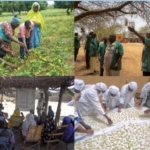


Centre de Cooperation Internationale en Recherche Agronomique pour le Developpement
CIRAD, Fuma Gaskiya, ICRISAT, INERA, INRAN, Mooribeen, UAM & UDDM
Burkina Faso Niger
3/2020—3/2024
Smallholder farmers in Niger use cowpea grains for human consumption and as a source of protein while the cowpea husks (obtained after grain shelling) and haulms (dried leaves and residues) are used as fodder for feeding animals. Cowpea cultivation also contributes to bio-regeneration of the soil by nitrogen fixation and provides ground cover, improving water availability to crops and reducing erosion. Several cowpea varieties have been developed based on centralized (on-station) breeding programs, but many of these varieties are only adapted to high-input monocultures, while farmers generally use cereal-legume intercrop systems and no/fewer agrochemical inputs.
The performance of released varieties in terms of dual-purpose (grain and fodder) production is also limited. Moreover, the parasitic weed Striga gesneroides causes severe damage to cowpea in West Africa. While some sources of genetic resistance are available, the utility of resistance in the field is compromised by the diverse races of Striga and the interaction of Striga infestation with variable environmental conditions.
The purpose of this request is to enhance cowpea varietal diversity and the set of technical practices available to fit farmers’ needs of cowpea production (grain, haulm) and processing (food, fodder) in a contextualized manner at selected locations in Niger and Burkina Faso. The project also aims to reinforce synergies with diverse stakeholders to promote the scaling up and impact of dual-purpose cowpea in terms of agroecological intensification, income generation, and nutrition. The project will continue to work in synergy with other CCRP-funded projects, including Child Nutrition (nutrition, processing), 3F (intercropping, management options), Sahel IPM (biological control), Women Fields, and Cati-Gao (on-farm testing). The project will also reinforce local partner capacity through an inclusive and collegial project governance that will enhance project management efficiency and favor the leadership of farmers and young researchers. Farmer-researcher co-creation is integrated in all activities. Thus, the project is well aligned with CCRP priorities such as agroecological intensification, legume integration, contextualized farmer research network approaches, and capacity strengthening activities.
Project outputs include:
Project outcomes will include:
